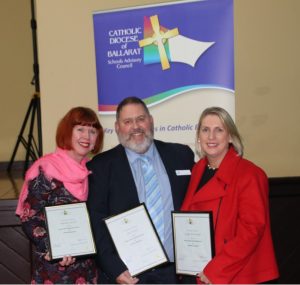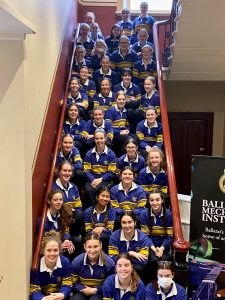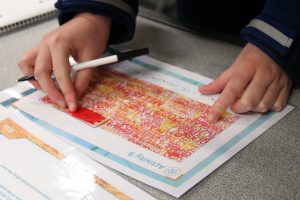
Catholic Diocese of Ballarat – 2018 Service and Leadership Awards
Congratulations once again to Mrs Mandy Carroll, Ms Linda McDonald and Mr Ian Stowe. In a year where we celebrate Justice and the Loreto Spirit these three outstanding educators are true Loreto leaders! Proudly presented at the Catholic Diocese of Ballarat Schools Advisory Council, Outstanding Service and Leadership Awards.
Speech by Mrs Mandy Carroll
I would like to express my sincere thanks to Bishop Paul, Father Kevin, the Ballarat CEO and all honoured administrators and guests, on behalf of the 32 recipients, for acknowledging those of us who have completed 30 years in the Catholic Education system. I have watched numerous fellow colleagues reach this milestone in the past and often wondered if I would ever make it myself, so it is with some surprise that I find myself before you tonight. It has come about quicker than I thought!
I am not going to assume that our collective road to this point is similar. There are at least 32 reasons why we have chosen to work and stay in this system; our qualifications, the location of the schools, previous education, family upbringing, opportunities, lifestyle choices, professional advancement, our values, strong leaders, good fortune, fate…the reasons are numerous and personal. I have chosen to briefly recount my own experiences in education, which included a stint in the State Education system and at an Anglican Independent school, in order to try and explain why I have stayed in Catholic education for 30 years.
Back in 1981, my mum received a phone call from the Education Department on Easter Sunday morning, to say that I had been offered a place as a Drama teacher at Kyneton High/Tech school, effective immediately. The delicious irony of the date was not lost on me. I had been temping as a receptionist at a doctor’s surgery whilst trying to find a teaching position and was holidaying in Finley, NSW, so drove to central Victoria to visit the school and make my decision. It was a tough gig and despite a supportive staff, an innovative construction and training curriculum in mechanics and engineering and a gorgeous setting, I became very homesick and applied for teaching positions back in Melbourne, with no particular preference.
Brother Leo Scollen, a De La Salle brother, was the principal of St John’s Regional College Dandenong at the time. A coeducational school, the Presentation and Mercy sisters worked closely with the De Las and Brother Cal Cusack, Sisters Barb Stapleton and Pat Foley are three names I have never forgotten. Brother Leo interviewed me for a Drama/English position. In my memory he was a giant of a man, instrumental in establishing the Balgo Hills Mission Catholic School near Halls Creek on the edge of the Great Sandy Desert in remote WA. I was fascinated. I quickly grew to liking these religious staff for their unassuming, practical, no nonsense approach. Nothing seemed impossible and they were so generous in their sharing of time and ideas. I had not met, let alone befriended anyone quite like them before. Based on my own education, these were people to be revered. But we worked well together, planning retreats, pastoral care programs and liturgies and suddenly, I found something in my profession that seemed to ignite a spark in students and someone who could do the same for me.
However, as a restless twenty something year old, I decided to throw my net elsewhere and worked as a tour guide at the Arts Centre and as a drama specialist at Princes Hill Primary school. But I knew it was only temporary. I wanted to find out more about secondary education and I felt at home working with people who seemed to have a keen sense of providing opportunities for reflection, for social justice and an understanding of spirituality.
Newly married, my husband and I decided to leave Melbourne and return to country Victoria. By now, I had narrowed my field to Catholic Schools. Sister Mary Duffy interviewed me for an English/RE position at Catholic College Bendigo. A Mercy sister, Mary was so much fun, maternal and warm. She oversaw three campuses and a huge student population like the expert she was. And with kangaroos grazing on the oval at what was then the Junortoun Campus on McIvor Highway, I was hooked. There were 13 km Walkathons along the old rail trail behind the school, Opening masses at the huge Schweppes centre and weekly masses in the tiny chapel, organised by the students and celebrated by Monsignor John Duffus. I loved the stories of the founding orders of the Marist Brothers and Mercy sisters and the old St Vincent’s Boy’s Boarding school site, with its wide cloister surrounding the central quadrangle, became my spiritual home for the next ten years.
Distance and too much car travel became the deciding factors in moving to Ballarat and I left the Catholic system for three years, to work as a boarding house mistress at Ballarat Grammar. My time in Catholic Ed could have ended there. Fabulous school, exceptional and kind headmaster and a chance to do what I love most of all; being a mum to 62 female boarders, all desperately homesick, in Woodbridge House.
But it wasn’t meant to be…or maybe it was. My own children needed me and with no position available at BGS, Anne Fry interviewed me for a temporary position at Loreto. I never looked back. I had come home. Here was a school with a fabulous story of strong women, and opportunities for the asking. Again, here was someone who saw things in her staff that could be good for both the individual and the organisation and I surprised myself with the things I started taking on. Judith Potter has taken the reins from Anne and I am indebted to her for the trust she has placed in me to promote a greater understanding of Catholic identity, of faith and of mission.
I’m sure a combination of any or all of these opportunities exist in any good school, if you are lucky enough to work in one of them. But what does it all boil down to? What makes teaching in the Catholic system inspiring enough to stay for 30 years or more? In the end, for me, despite all the wonderful principals and colleagues and post codes and stories, it comes down to one solitary figure, who lies at the heart of my Catholic faith and from there, my teaching. And it is His story which continues to puzzle me, to confound me and still inspire me to ensure it remains, in spite of at times seemingly insurmountable odds, at the forefront of all my actions and decisions and those of my students.
To quote Dr James Allan Francis,
Here is a man who was born in an obscure village, the child of a peasant woman. He grew up in another village. He worked in a carpenter shop until He was thirty. Then for three years He was an itinerant preacher.
He never owned a home. He never wrote a book. He never held an office. He never had a family. He never went to college. He never put His foot inside a big city. He never traveled two hundred miles from the place He was born. He never did one of the things that usually accompany greatness. He had no credentials but Himself…
While still a young man, the tide of popular opinion turned against him. His friends ran away. One of them denied Him. He was turned over to His enemies. He went through the mockery of a trial. He was nailed upon a cross between two thieves. While He was dying His executioners gambled for the only piece of property He had on earth – His coat. When He was dead, He was laid in a borrowed grave through the pity of a friend.
Twenty long centuries have come and gone, and today He is a centerpiece of the human race and leader of the column of progress.
I am far within the mark when I say that all the armies that ever marched, all the navies that were ever built; all the parliaments that ever sat and all the kings and queens that ever reigned, put together, have not affected the life of man or woman upon this earth as powerfully as has that one solitary life.
In the end, we are all truly blessed. Thank you.


